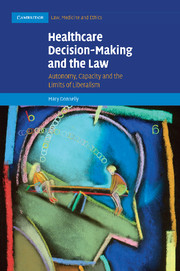Book contents
- Frontmatter
- Contents
- Acknowledgements
- List of cases
- List of legislation
- Introduction
- 1 Autonomy: variations on a principle
- 2 Autonomy in the law
- 3 Capacity: the gatekeeper for autonomy
- 4 Capacity assessment in practice
- 5 Autonomy, rights and decision-making for patients lacking capacity
- 6 Treatment for a mental disorder: a case apart?
- Conclusion
- Bibliography
- Index
- References
2 - Autonomy in the law
Published online by Cambridge University Press: 04 February 2011
- Frontmatter
- Contents
- Acknowledgements
- List of cases
- List of legislation
- Introduction
- 1 Autonomy: variations on a principle
- 2 Autonomy in the law
- 3 Capacity: the gatekeeper for autonomy
- 4 Capacity assessment in practice
- 5 Autonomy, rights and decision-making for patients lacking capacity
- 6 Treatment for a mental disorder: a case apart?
- Conclusion
- Bibliography
- Index
- References
Summary
It is perhaps surprising that there is no express reference to a right of ‘autonomy’ (or ‘self-determination’) to be found in any of the leading bills of rights. Rather, the right is part of what Laurence Tribe calls, in respect of the United State Constitution, the ‘invisible constitution’ While this does not diminish the degree of support the right enjoys (not least because the right also has a basis in the common law), it has meant that the ambit of the right receives relatively little legal analysis. Rather, the right tends to be invoked, often in a medical context, without any attempt to fit the right as applied within a broader analytical framework. Since Cardozo J's dictum in Schloendorff v. Society of New York Hospital, the status of autonomy as a principle of non-interference has been largely uncontested in healthcare law. This is not least because, in many ways, respect for this form of autonomy sits comfortably with the law. Not only are the legal tools for enforcing this form of autonomy long established in the tort of trespass, respect for the principle also allows courts to avoid engaging in judgments about the utility or morality of particular conduct and provides neat answers to difficult dilemmas.
This chapter considers the nature of the law's treatment of the principle of autonomy in the context of healthcare decision-making. It begins by outlining the sources of legal support for the principle.
- Type
- Chapter
- Information
- Healthcare Decision-Making and the LawAutonomy, Capacity and the Limits of Liberalism, pp. 49 - 89Publisher: Cambridge University PressPrint publication year: 2010



